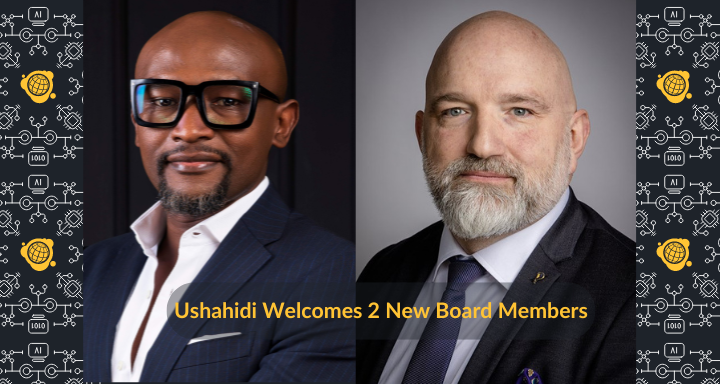Ushahidi Expands Board with Two New Visionary Leaders

Jul 10, 2024

Nairobi, Kenya: Ushahidi, the globally recognized non-profit technology organization, is excited to announce the addition of two remarkable individuals to its Board. These new appointments reflect Ushahidi’s ongoing commitment to diverse and visionary leadership, aiming to drive positive change across the globe.
After an overwhelming response to our open board call in May 2023 and a thorough selection process, we are thrilled to introduce our newest board members, who began their terms in June 2024. Their expertise and passion will help steer Ushahidi towards even greater innovation and impact.
Meet Our New Board Members

Mark Kamau is a seasoned Human Centered Designer with a multidisciplinary background, specializing in designing solutions for emerging markets across Africa and beyond. He founded Africa's first open Human Centered Design Lab at iHub, serving a community of over 16,000 members and numerous startups. Additionally, he established Africa's first design week, Tajriba, also known as Nairobi Design Week.
Mark's notable roles include Director of User Experience Design at BRCK, where he helped build the Moja network, Africa's largest public connectivity infrastructure, recognized by Forbes as one of the top 50 most innovative companies globally. Currently, he offers human centered design consultancy through his company, Designing African Futures, working with clients such as Google, Intel, IDEO, Grameen Foundation, MasterCard, GIZ, the World Bank, and local startups. As the Interaction Design Association coordinator for Kenya, Mark advocates for design's power to create a more inclusive world. An avid camper and food enthusiast, he also enjoys connecting with people globally.

Gísli Rafn Ólafsson, born and raised in Iceland, has a uniquely varied career spanning the globe. He sold his first program at 14 and went on to work for leading tech companies like Microsoft, Xerox, and Medtronic for 22 years. His passion for helping others was channeled through volunteer work with the Red Cross and a local search and rescue (SAR) team in Iceland, eventually becoming an incident manager in 1998.
In 2007, Gísli transitioned his volunteer experience into a professional role at Microsoft, advising governments and international organizations on using technology for disaster preparedness and response. He led field response efforts for Microsoft’s Disaster Response Team, merging his passions for technology and humanitarian aid. Following a reorganization at Microsoft, he joined the non-profit sector as Emergency Response Director for NetHope, a consortium of over 60 international NGOs.
In 2021, Gísli returned to Iceland and entered politics, becoming the 63rd member of Parliament (out of 63) for the Pirate Party, which secured six seats with around 10% of the vote.
These new members join an already distinguished board that includes:
- Mark Surman, President of the Mozilla Foundation, a champion of internet health and privacy.
- Priscilla Chomba-Kinywa, Chief Technology Officer at Greenpeace International, an advocate for digital transformation and climate action.
- Ginger Zielinskie, Chief Growth Officer at The Federation of American Scientists, integrating science and technology into public discourse.
- Dorothy Ooko, Head of Communications and Public Affairs, Africa at Google, known for her expertise in technology and media relations.
- Tamara Giltsoff, an innovation leader with a background in technology and sustainable development.
Together, this exceptional group will guide Ushahidi’s efforts to promote collaboration, innovation, and positive societal impact worldwide.
About Ushahidi:
Founded in 2008, Ushahidi empowers people through citizen-generated data to develop solutions that strengthen their communities. Ushahidi's integrated tools and services promote collaboration, innovation, and positive impact worldwide.
Ushahidi's path to impact follows a simple but powerful 3-part process: our Theory of Change. First, we help organizations and communities with technology and expertise (Part 1). This empowers partners to gather important information from people (Part 2), and when we all work together, it leads to making communities stronger and creating positive change (Part 3).